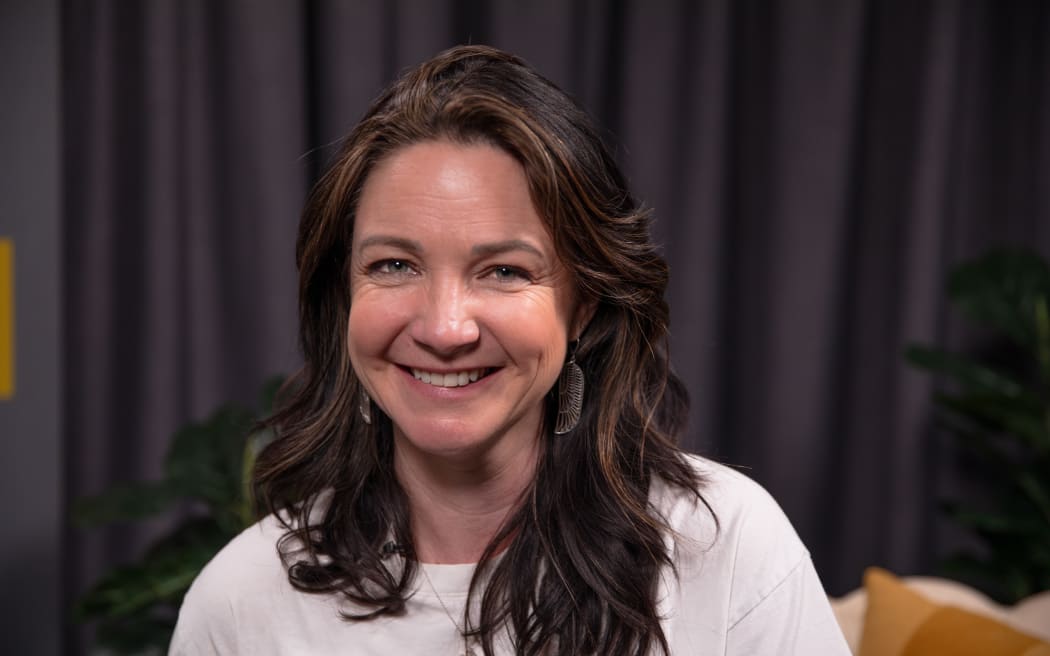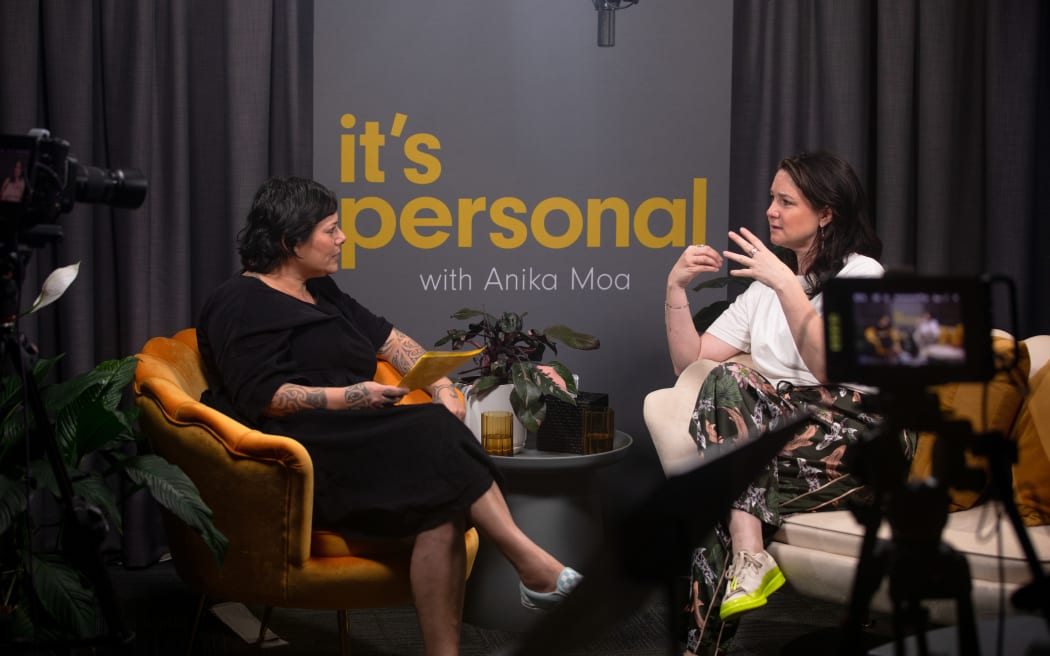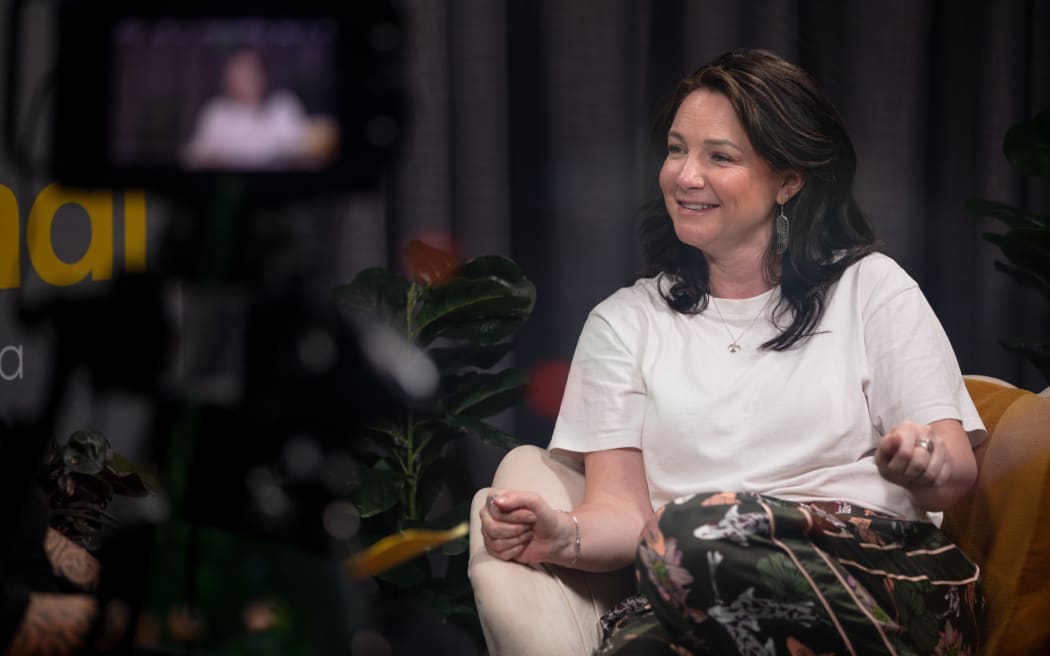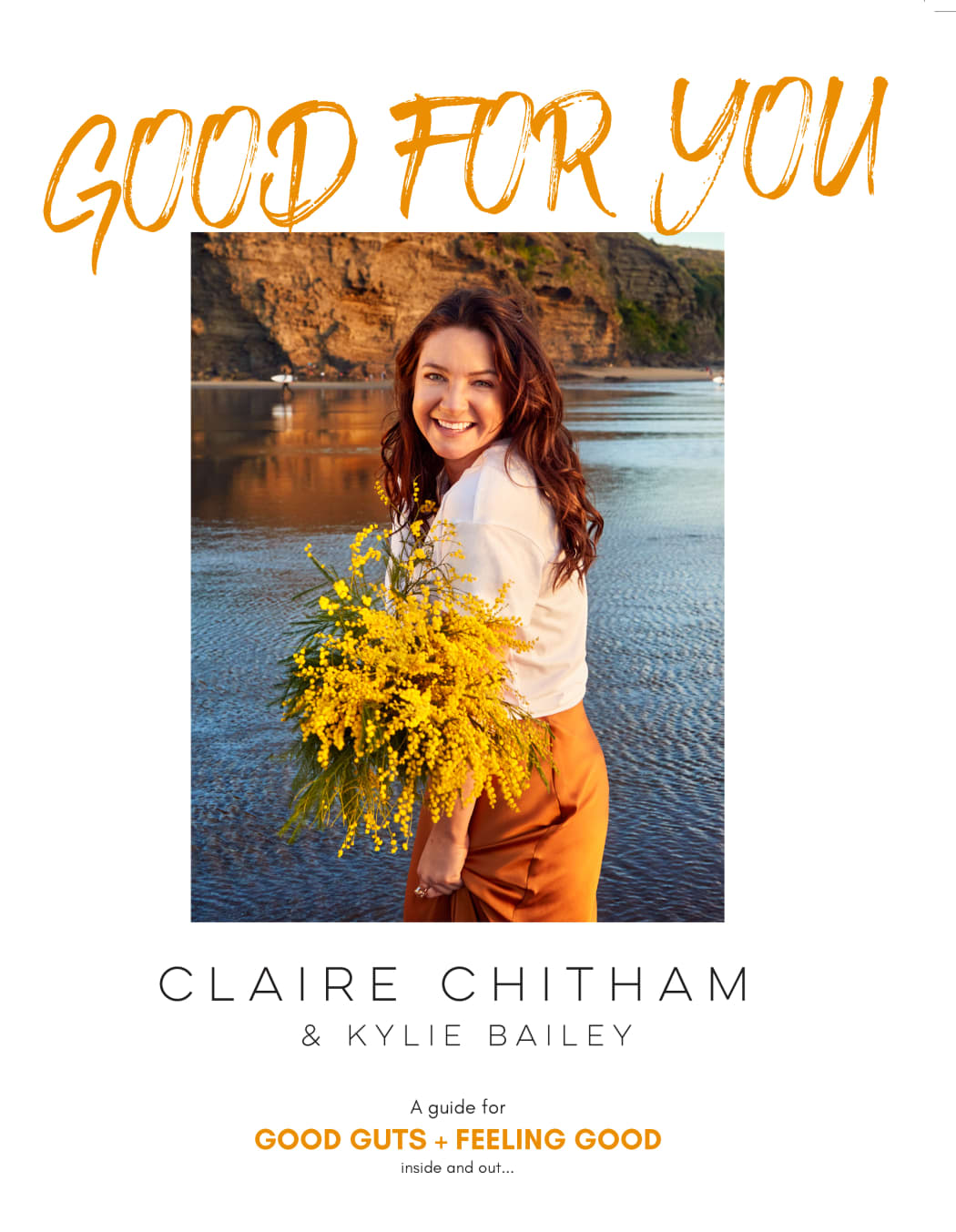From Waverley to Aurora and beyond, Claire Chitham has graced our screens for decades now.
She's also recently written a book about wellness, detailing her discoveries while on her own health journey, after being diagnosed with Crohn's Disease as a teenager.
Follow It's Personal with Anika Moa on YouTube, Apple Podcasts, Spotify, iHeart or wherever you get your podcasts.

Claire Chitham Photo: RNZ / Cole Eastham-Farrelly
On Outrageous Fortune
"I think it was a reflection of a side of New Zealand that we all, a) recognize about ourselves, but b) actually love about ourselves. It's the grubby, basic side of you that we all have. And I think the thing that was wonderful about watching the Wests was that it was a family unit that was bound by blood above all else. So there was absolute, commitment and love there in a family way. But it was a group of people that were allowed to behave badly, and they lived outside of society's sort of norms, and they were allowed to break the rules, and we got to watch them break the rules."
"When I got Aurora, and I'd done a lot of theater, and I'd been doing some other things, and I'd become a Pilates trainer, because I was terrified I was never going to work in this country again. And I remember getting the audition and going, this one's mine."
"I remember the first scene that I shot was so difficult and embarrassing. Even though I was 26, which now sounds really young, I was surrounded by 18 year old lingerie models and I was having to model in the Hoochie Mama underwear contest. I was having to basically dance like a stripper on stage in front of a lot of people. And I remember the director, Mike Beesley, coming up to me at the end when we'd finished shooting that scene, and he was like, nobody's going to be thinking of Waverly now, babes."

Playing Aurora was a big change from Claire's breakout performance of Waverley on Shortland Street. Photo: RNZ / Cole Eastham-Farrelly
On being diagnosed with Crohn's Disease
"I was, twelve. I was complaining of pains and my mum thought that I was starting to get my period so she had me on the Ponstan, which was an anti-inflammatory. I'd eat and then I can still intensely remember the feeling of the pain that would start to occur in my gut. And I would go away and crawl and lie down on my side in a bed with my knees pulled up to my chest and hide from people while the pain passed."
"I lost a lot of weight, I was anemic. I've got a photo of me looking very pale and gaunt and skinny, starting my first day of high school and my uniform falling off me. But I got put on medication and I had to take three huge pills, three times a day and I was in my mother and father's care and so I guess the pain started to get under control. Things felt okay and on I went with my teenage life. Cut to 17 / 18, I'd moved out of home, I got my role on Shorty Street, I was in charge of looking after myself and stopped taking the pills because who wants to take that? Didn't know anything about the illness, wasn't educated on it and started to get pains back."

Claire said it was 10 years before she allowed herself relax and acknowledge she had the Crohn's under control. Photo: RNZ / Cole Eastham-Farrelly
"I was eating my takeaways every night, drinking a 1.5 litre bottle of Coca Cola a day, eating the sugary treats while I was doing my twelve hour a day job at an intense level and then partying all weekend. And yeah I reached breaking point. I was crippled over in pain at a boyfriend's house and he freaked out and was like I'm calling your parents."
"I got taken into hospital the next day because the inflammation levels in my blood were too high and dangerous and I was about to need surgery and they were going to do a bowel resectioning surgery. My specialist at the time was an amazing woman who had started to specialize in Crohn's and she tried me on a new drug that night and it worked, it started to take the inflammation down. So they kept me in hospital for like, six days on a drip. And after that I was on really high doses of steroids. Like, anyone who's had chronic illness kind of ends up on something like Prednisone, and you get a puffy face, there's a lot of water retention. I still had to go back to work, and put my puffy face on national television, so there was a lot going on. But one of those mornings the doctor walked in to the hospital, when she walked in and said, look, the drugs are working, so we think we can prevent having surgery, but you're going to be on a drug for this for the rest of your life. And I had this really loud voice in my head that went, 'F**k no'."
Getting better
"All of a sudden, all that mattered was my journey to fix this problem. And I was earning enough money to be able to start seeing people that maybe cost $160 per pop. I knew I was in a really privileged position and I did not take that for granted once. And I could afford to start switching to eating organic food and removing toxicity and going to healing people. But that took me four and a half years of that until I came off my last medication for Crohn's."

Claire's book has ideas and suggestions for living well Photo: Supplied
"I had changed my diet. I had stopped smoking. For a while I gave up dairy, I gave up things that were very inflammatory. I didn't drink alcohol, but I wasn't really drinking it already because it really messed with my stomach. I'd started doing pilates. I felt strong. I'd built strength in my stomach where I'd never had it before."
"I guess back then I felt very defined, by my disease, which was horrible. If you get to your late 30s, early 40s it is, unfortunately, a time where your body is going to start sending you the messages to tell you what is wrong and what it can no longer cope with."
"I stressed about it for ten years and then I got into my 30s and I was like, 'Okay, girl, you got this far, it's okay, like, breathe. If it comes back, you'll deal with whatever, you're okay'. And the letting go of the stress was wonderful and a relief mentally."
"You have to learn about what is good for you because it is not going to be the same as what is good for me. It's really important that we start to pay attention and look after our own bodies and not do what everyone else is doing just because it's a trend or being sold to you. That is my wish for people, is that they figure out the prescription for their own health."
"We are idiots and we're slow. And I think that [the] advancement of society is moving us fast and it's faster than nature. And nature is where we need to sit. We will wake up to the same sun and go to sleep with the same moon at the same time. That can't change. We are the product of a society that was focused on the industrial revolution and growth at an exponential pace. And now we have to shift that focus if we're going to change the way we are a) living our lives, b) affecting the planet, and c) looking after our health."

